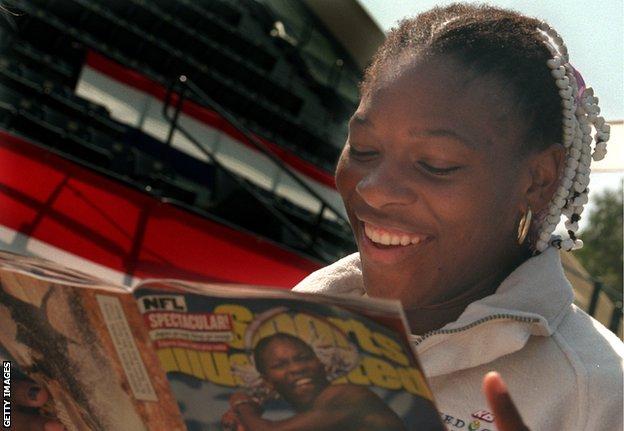
As the story goes, Serena Williams’ rise began before she was born.
In 1979, her father Richard watched a women’s tennis match on TV and saw the Romanian player Virginia Ruzici win $40,000 – about $4,000 more than his annual salary.
“I went and told my wife we had to have two more girls and make them tennis players,” he recalled, 20 years later. “I was 37 and knew nothing about tennis but I thought we could teach them and they could win the US Open.”
On 26 September 1981, Williams arrived – 15 months after her sister Venus. By the time the pair turned pro in the mid-1990s they were already making waves.
“There was a rage inside these two little kids,” says Rick Macci, the Florida-based coach who helped guide them through their developmental years.
“They were just ready. I called it when they were nine, 10 years old. I said: ‘They’re gonna be world number one and they’re going to transcend the sport.'”
In August 1999, the smart money was on Venus making the big breakthrough. A tall and imposing player, the 19-year-old had already racked up seven titles. She was third in the WTA rankings.
But Serena would get there first. Her victory at the US Open that year saw a future sporting legend announced to the world.
Now, 23 years later, she is almost done.
“I hate it,” she wrote last month of her impending retirement. “I don’t want it to be over.”
In some ways, it already is. With her 41st birthday looming, Williams can no longer match her own imposing legacy on court.
She has one more stop. From Monday she will return to Flushing Meadows to play in her final US Open, the site of that first Grand Slam title.
Looking back on those two weeks of New York late summer in 1999, the signs were already there of what was to come for Williams. She was irrepressible, unpredictable, matchless. A 17-year-old girl from Compton, poised for greatness.

Williams had made her US Open debut in 1998, when she was knocked out in round three.
This year, things looked different. She breezed through the two opening rounds against fellow American Kimberly Po and Croatia’s Jelena Kostanic.
Her father Richard had already stirred a minor drama, predicting that his daughters would meet in the final. “They’re too fast for the other girls,” he said. “They’re a little too strong for them.”
World number one Martina Hingis replied saying the Williams family had a “big mouth”.
Serena laughed it off.
“Obviously she’s number one, so she can…
Click Here to Read the Full Original Article at BBC Sport – Tennis…

